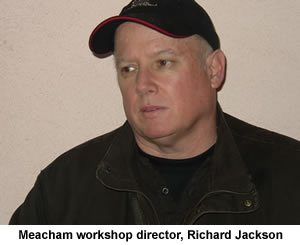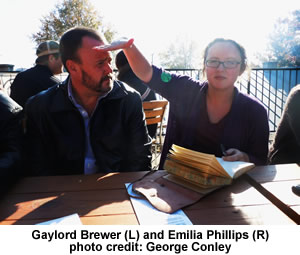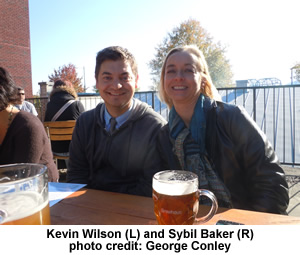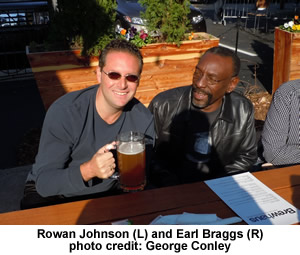It’s not every day that attendees at a poetry reading are asked whether they mind being filmed by an MTV camera crew, but that’s exactly what happened at the opening event of last month’s Meacham Writers’ Workshop in Chattanooga. The reading was held at Chattanooga State Community College, where one of the stars of MTV’s reality show “Teen Mom” is a student. It was an unusual beginning to a three-day conference that is itself unique. The Meacham workshop is held twice each year, primarily on the campus of the University of Tennessee at Chattanooga. Its organizers are UTC and Chattanooga State faculty members and students, and all of its readings, workshops, and individual conferences are free of charge and open to participation by anyone in the community, no registration required. According to renowned poet, UTC professor, and Meacham founding director Richard Jackson, it’s the only writers’ conference in the country that is free and open to the public.
 At Jackson’s suggestion, the Meacham Writers’ Workshop was established in 1985 by an endowment grant from the late Jean Meacham, teacher at UTC, in honor of her husband Ellis Meacham, a municipal court judge and the author of three novels set in India. Jean Meacham’s goal, according to the workshop’s website, was “to create an informal atmosphere where nationally known writers, local writers, students, and novice writers and their readers could freely, and on an equal basis, exchange ideas, works, and readings.” Every spring and fall, UTC invites a dozen or more nationally and internationally recognized writers of poetry, fiction, and creative nonfiction to speak, read their work, and, most importantly, to meet with anyone who is interested in the craft of writing. For each attendee who chooses to submit a writing sample, the Meacham organizers schedule a one-on-one session with a visiting writer who critiques the work in an informal setting.
At Jackson’s suggestion, the Meacham Writers’ Workshop was established in 1985 by an endowment grant from the late Jean Meacham, teacher at UTC, in honor of her husband Ellis Meacham, a municipal court judge and the author of three novels set in India. Jean Meacham’s goal, according to the workshop’s website, was “to create an informal atmosphere where nationally known writers, local writers, students, and novice writers and their readers could freely, and on an equal basis, exchange ideas, works, and readings.” Every spring and fall, UTC invites a dozen or more nationally and internationally recognized writers of poetry, fiction, and creative nonfiction to speak, read their work, and, most importantly, to meet with anyone who is interested in the craft of writing. For each attendee who chooses to submit a writing sample, the Meacham organizers schedule a one-on-one session with a visiting writer who critiques the work in an informal setting.
The Meacham weekend includes many readings at various locations throughout the community, panel discussions, and workshops. But the real heart of the program, at least for Richard Jackson, is the individual interaction between the experienced writer and the novice, whether during a pre-scheduled conference or over a casual meal, and writers invited to Meacham must be prepared to give generously of their time and their professional encouragement: “What we really try to emphasize is that sense of openness and camaraderie,” Jackson said in an interview. “Everyone’s equal. A person who’s just starting off [as a writer] can talk to this person who just won the Pulitzer Prize, and they’re going to treat you as an equal. Informal get-togethers are so important, even more than the formal events. You can sit down and talk to a writer, whether about baseball or writing. That sense of camaraderie, that sense of equality—democracy maybe—is something I think that’s really, really crucial to this program.”
 This opportunity for free-flowing communication attracts successful writers who want to be involved in the Meacham experience. Sewanee’s Kevin Wilson, whose first novel, The Family Fang, was published last summer to great acclaim, returned to Meacham this fall in part because of the friends he made during his last visit. Thanks to the number and variety of events over the three-day period, he had an opportunity to spend time with other attendees and really get to know them. “For me, it’s the fact that [the conference] is incredibly personal and that Meacham is really good about saying: Look, we’re not putting up a wall between the reader and the author here; we want everybody to interact and talk and create conversation,” he said in an interview.
This opportunity for free-flowing communication attracts successful writers who want to be involved in the Meacham experience. Sewanee’s Kevin Wilson, whose first novel, The Family Fang, was published last summer to great acclaim, returned to Meacham this fall in part because of the friends he made during his last visit. Thanks to the number and variety of events over the three-day period, he had an opportunity to spend time with other attendees and really get to know them. “For me, it’s the fact that [the conference] is incredibly personal and that Meacham is really good about saying: Look, we’re not putting up a wall between the reader and the author here; we want everybody to interact and talk and create conversation,” he said in an interview.
Last year in an interview with Chapter16, Khaled Mattawa, a Libyan native and award-winning poet who graduated from UTC and now serves on the faculty of the University of Michigan, called Richard Jackson “a wonderful influence,” and the Meacham workshops “as good as any graduate program I could have gone to. I had a chance to workshop with Edward Hirsch and Christopher Buckley and to have conferences with Mark Jarman, Carol Frost, and the late Jim Simmerman. Having Philip Levine come to a party at my apartment and twisting his arm to look at a poem that he did not think was good enough to workshop was a moral victory for me.”
Richard Jackson believes this kind of exposure is crucial to the development of his students’ own voices as writers, and to their world view. He tries to incorporate an international component to each Meacham workshop and has been host to writers from Israel, Slovenia, the Czech Republic, Germany, Hungary, Romania, and Great Britain, among others. “The students get a sense of what it’s like to be a writer and to live in the world,” Jackson said. “And so it helps them mature much faster, plus they get a lot of different opinions about their writing. And they see all different kinds of writing styles, which is really valuable.”
In an extension of this philosophy, Jackson also takes small groups of students abroad each summer in order to meet writers who work in other cultures and other languages. To illustrate the sometimes surprising benefits of such trips, he tells the story of their 1998 trip to a writer’s conference in Slovenia, where they met Swedish poet Tomas Tranströmer (this year’s winner of the Nobel Prize in Literature). Tranströmer’s ability to speak had been severely compromised by a recent stroke, and as a result he was being somewhat overlooked at the event. Jackson introduced himself and began to communicate through Tranströmer’s wife. As a result of his overture, Jackson says he and his students had the celebrated poet “all to ourselves for four days.” These serendipitous moments of connection animate Jackson’s teaching and his own writing: “It energizes you: you hear new voices, you hear new ideas. It’s great.”
 Meacham veterans understand that the writing life presents unique challenges, so when writers gather together in a spirit of mutual support and encouragement, it can benefit everyone, and not just the novices. Kevin Wilson explains: “It’s still weird to say that you write. It feels like this secret you shouldn’t tell people. Having people that you can count on or having a place where all these people gather—it makes you realize that what you’re interested in is not this dying art form, that it’s actually vibrant and that there are people still interested in it. And it’s good to be reminded of that because when you’re alone and you’re trying to write, it’s easy to get discouraged and to feel like you’re not contributing or that what you’re contributing isn’t appreciated. Wilson’s own hilarious reading of the “Romeo and Juliet” chapter from The Family Fang was a definite audience favorite at the most recent Meacham workshop.
Meacham veterans understand that the writing life presents unique challenges, so when writers gather together in a spirit of mutual support and encouragement, it can benefit everyone, and not just the novices. Kevin Wilson explains: “It’s still weird to say that you write. It feels like this secret you shouldn’t tell people. Having people that you can count on or having a place where all these people gather—it makes you realize that what you’re interested in is not this dying art form, that it’s actually vibrant and that there are people still interested in it. And it’s good to be reminded of that because when you’re alone and you’re trying to write, it’s easy to get discouraged and to feel like you’re not contributing or that what you’re contributing isn’t appreciated. Wilson’s own hilarious reading of the “Romeo and Juliet” chapter from The Family Fang was a definite audience favorite at the most recent Meacham workshop.
Other notable readers among the twenty-plus featured last month included longtime Meacham supporters Pamela Uschuk and William Pitt Root, poets from Colorado. In his lecture, Root illustrated the concept of voice by describing an 1862 meeting between Charles Dickens and Fyodor Dostoyevsky. “There are two people in me: one who feels as he ought to feel and one who feels the opposite,” Dickens told Dostoyevsky. “From the one who feels the opposite I make my evil characters, from the one who feels as a man ought to feel I try to live my life.” To which Dostoyevsky famously replied, ‘“Only two people?”
UTC alumni were well represented by Jane Bradley, who read a gripping excerpt from her crime novel You Believers, and Bradley Paul, whose poem “A Monkey Could Write This Poem,” from his collection The Animals All Are Gathering, provided a dose of whimsy. UTC professors also read: highlights included Tom Balázs reading “Birdhouses,” a work of creative nonfiction, and Rebecca Cook reading her poem “Maneater,” a litany of suggestive recipe titles whose main ingredient no doubt made all the men in the room a little uncomfortable.
 UNC-Wilmington professor Mark Cox gave an incredibly moving presentation of four poems written for his children, beginning with the proposed title poem of his next collection, “All That Shimmers and Settles Along the Roads of Our Passage”—a beautiful meditation on time and loss—in a manner that felt more like the offering up of an open vein than the simple reading of words on paper. Middle Tennessee State University poet Gaylord Brewer read selections from his collection Give Over, Graymalkin and the chapbook Ghost, the latter featuring poems about an enigmatic alter ego by the same name.
UNC-Wilmington professor Mark Cox gave an incredibly moving presentation of four poems written for his children, beginning with the proposed title poem of his next collection, “All That Shimmers and Settles Along the Roads of Our Passage”—a beautiful meditation on time and loss—in a manner that felt more like the offering up of an open vein than the simple reading of words on paper. Middle Tennessee State University poet Gaylord Brewer read selections from his collection Give Over, Graymalkin and the chapbook Ghost, the latter featuring poems about an enigmatic alter ego by the same name.
A final Meacham pleasure was the distinguished poet Charles Fort, who gave a reading that was half bravura performance, half educational seminar, with asides to his rapt audience on wide-ranging topics like the villanelle form, Ingmar Bergman, Tennyson, Robert Johnson, Dante, and James Brown. His rhythmic and resonant reading of “We Did Not Fear the Father,” from his forthcoming book of the same name, was preceded by a description of his own father as “John Henry, Paul Bunyan, and Muhammed Ali, all in one. He worked from eleven to seven making ball bearings in a factory—night shift—for forty years; he worked from nine to five as a barber for forty years; he was the landlord in our three-story tenement (all nine of us were on the first floor).” Fort wrapped up the introduction by saying, “If there’s a Superman here, you’ll meet him in this poem.”
Readings from last month’s Meacham conference are available free on iTunes and are well worth a listen by anyone interested in the craft of writing. But the intended beneficiaries of this wealth of language and learning are, of course, the aspiring Meacham writers. During their readings, several authors complimented the UTC students for their level of interest in and dedication to writing. In an interview, Meacham’s Student Coordinator Laurel Jones, a senior from Nashville and a veteran of four years of workshops, somewhat breathlessly summed up the Meacham experience for students: “I feel like you can’t really understand Meacham unless you’ve been here. It’s a three-day extravaganza of events and meeting people and making friends and having your work looked at, and it’s really intensive, and there’s so much creativity everywhere, and it really makes you want to write!”





